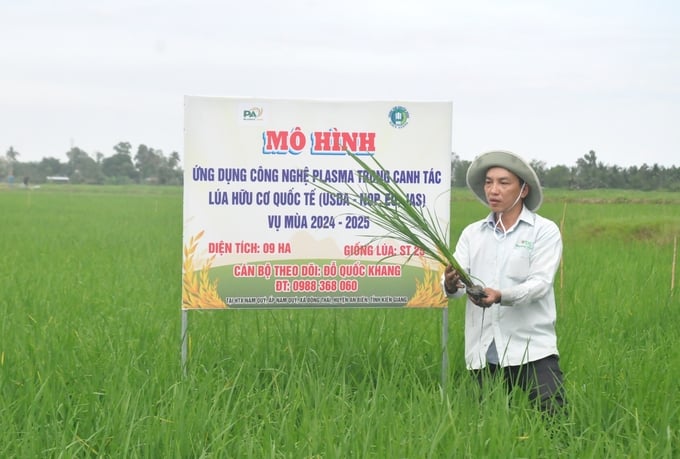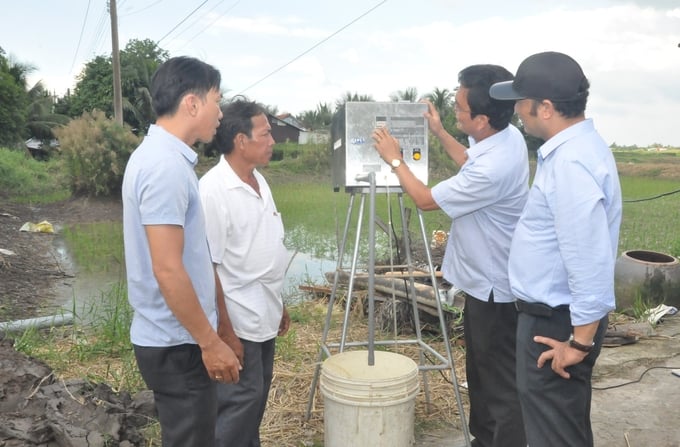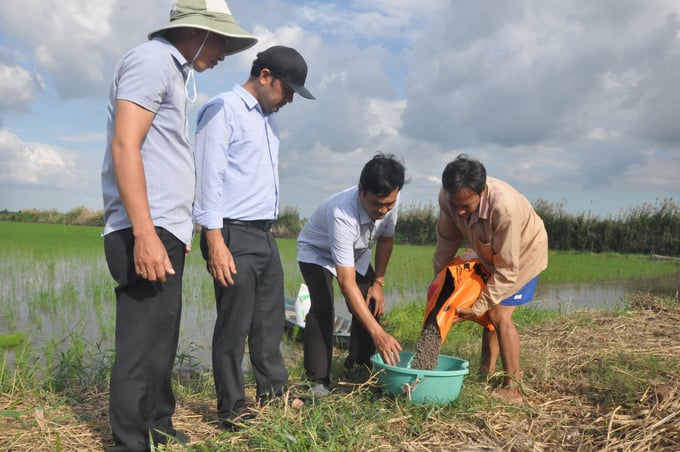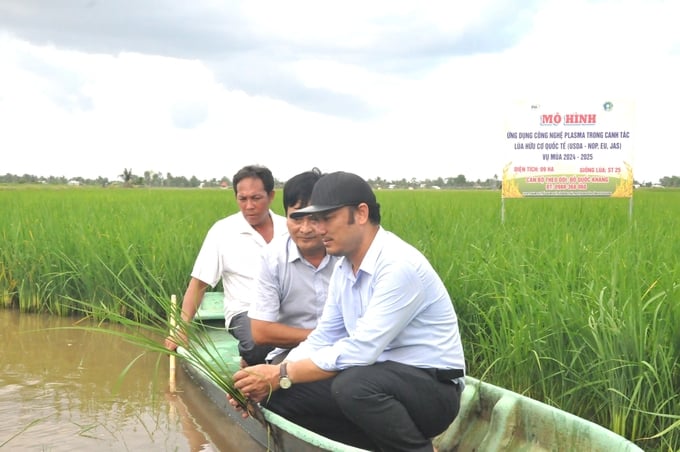November 28, 2025 | 04:18 GMT +7
November 28, 2025 | 04:18 GMT +7
Hotline: 0913.378.918
November 28, 2025 | 04:18 GMT +7
Hotline: 0913.378.918

Nam Quy Agricultural Cooperative is a farmers' organization pioneering in producing rice according to international organic standards and contracted by businesses to consume, process, and export rice. Photo: Trung Chanh.
After visiting the field, Mr. Pham Chi Thuong, Director of Nam Quy Agricultural Cooperative (Dong Thai commune, An Bien district, Kien Giang), decided to apply additional fertilizer for rice. When transferring the bags of fertilizer from the warehouse, seeing me look at the bags of fertilizer curiously, Mr. Thuong explained, "This is organic fertilizer imported from Japan, meeting the requirements for growing rice according to international organic standards."
An Bien district is one of four districts in the U Minh Thuong region, planned as a key area for development following Kien Giang province's rotation model of one rice crop and one shrimp crop (rice-shrimp model). Accordingly, in the rainy months, farmers will take advantage of rainwater to grow rice. In the dry months when salt water intrudes, farmers switch to brackish water shrimp farming.
According to Director of Nam Quy Agricultural Cooperative Pham Chi Thuong, the rice-shrimp rotation model is the ideal environment to apply organic production processes. After the shrimp crop, residual substances such as shrimp feces and bottom organic humus are an effective source of nutrients for rice plants. In the opposite direction, rice plants will clean the environment, creating a favorable environment for cultivating the next shrimp crop. Just like that, a closed cycle is formed.

Nam Quy Agricultural Cooperative received equipment support from the business to create plasma-activated water for organic rice production according to international standards. Photo: Trung Chanh.
Nam Quy Agricultural Cooperative has a farming area of 198 hectares, producing according to the rice-shrimp model. Since 2017, members of Nam Quy Agricultural Cooperative have jointly applied organic processes to production. They received technical training from the specialized sector and support for organic certification costs and linked with businesses to invest in input materials and sign product consumption contracts.
Director Pham Chi Thuong said, "After many years of continuously and diligently applying the process of transforming from inorganic production to organic production, in 2019, Nam Quy Agricultural Cooperative achieved organic certification for rice plants. All rice output is purchased and processed by the business for export."
According to Mr. Thuong, organic production has many benefits, so cooperative members are determined to do it. The most obvious is the environmental benefit. Without pollution and toxic chemicals, shrimp, crabs, and fish multiply and develop. Health benefits are for farmers and consumers. Regarding economic benefits, working on shrimp farming land means low investment costs. Products are sold under contract at high prices, bringing more profits to farmers.

Standardized input materials, including organic fertilizer imported from Japan, meet requirements for growing rice according to international organic standards. Photo: Trung Chanh.
Investing in organic farming, for many years, Nam Quy Agricultural Cooperative has mainly cultivated ST25 rice, a rice variety with the best quality rice in the world, according to businesses' ordering contracts. Currently, Nam Quy Agricultural Cooperative is collaborating with Ho Quang Tri Private Enterprise, Hong Tan Rice Company Limited, and Plasma Vietnam Agriculture Joint Stock Company, which provide input materials, processes, and technology for organic rice production and consumption of products.
Deputy General Director of Plasma Vietnam Agriculture Joint Stock Company, Mr. Ong Nhat Anh, said that in the linkage with organic rice production cooperatives, the unit will invest in seeds and transfer technical processes, meeting strict organic standards of countries such as Japan, the US, and Europe. In particular, the company supports technology and equipment to create plasma-activated water for organic production. The activated water will be used to soak rice seeds and spray 4 times/rice crop according to the rice growth cycle.

Nam Quy Agricultural Cooperative's rice field, produced according to international organic standards, is contracted by businesses to purchase, process, and export to EU, US, and Japanese markets. Photo: Trung Chanh.
According to Mr. Ong Nhat Anh, plasma-activated water is a new solution in organic farming. The water has nitrogen-compensating properties, providing nutrients for rice plants to grow. Thereby helping to reduce the amount of organic fertilizer in fertilization sessions. At the same time, spraying plasma-activated water also helps rice plants resist pests, reducing the cost of pest and disease prevention and control. Thanks to that, rice still ensures productivity and increases product quality when applied with organic processes.
Mr. Le Huu Toan, Director of Kien Giang Department of Agriculture and Rural Development, said that implementing the Organic Agriculture Development Project for the 2021-2030 period in the province, by 2024, the whole province will produce 27,087 hectares of rice production reaching SRP, organic, GlobalGAP, and VietGAP standards, control residues, and is in the process of converting organic production, meeting the demand for raw materials for processing and exporting to EU, US, and Japanese markets.
Translated by Thu Huyen
/2025/11/27/3830-1-152901_403.jpg)
(VAN) Dong Nai is developing its key crop areas, expanding planting area codes, and applying high technology to increase the value of agricultural products, aiming at a green and sustainable agriculture.

(VAN) Tay Ninh’s livestock sector is undergoing a major transformation, applying high-tech, closed-loop circular models to build sustainable value chains.
/2025/11/26/3627-4-082628_818.jpg)
(VAN) From a small café on the red basalt highlands, Le Van Hoang started a business with clean coffee, building Enjoi Coffee into a symbol of organic agriculture in the Lam Dong plateau.
/2025/11/25/0045-1-135246_13.jpg)
(VAN) Ca Mau is researching a model of sea-encroaching embankments combined with viaducts and logistics service zones, aiming both to prevent erosion and create land funds for marine economic development.

(VAN) The information was shared at the seminar 'Urban Agriculture - Solutions for Developing Green Spaces,' organized by the Kinh te & Do thi Newspaper and the Biotechnology Center of Ho Chi Minh City.
/2025/11/19/4141-2-132831_216.jpg)
(VAN) One of Japfa's outstanding solutions is implementing digital transformation and artificial intelligence (AI) to optimize operations, enhance productivity, and advance sustainable development.
/2025/11/19/4847-1-093540_448.jpg)
(VAN) The Gia Lai Provincial People’s Committee had a working session with the delegation of the U.S. Department of Agriculture, the State of Idaho, and representatives of the State's leading enterprises.